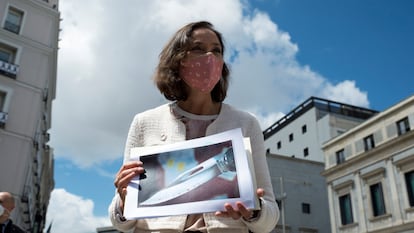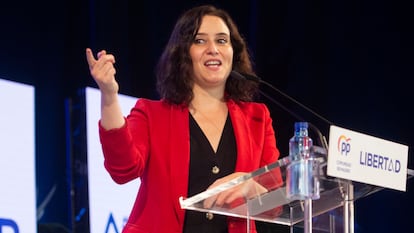Madrid election campaign descends into toxic battle
The political debate has given way to a series of ever-more concerning criminal incidents and regular clashes over fascism and the rise of the far right


The campaign ahead of the May 4 regional elections in Madrid has exploded. In just a few days, the discourse has moved on from the passionate debate between the candidates on the Telemadrid regional TV channel about the handling of the pandemic, to a series of ever-more concerning criminal incidents and regular clashes involving words that are charged with meaning and history: fascism, democracy, communism and freedom.
On Monday, the Spanish tourism minister, Reyes Maroto of the governing Socialist Party (PSOE), was sent a package containing a bloody knife. She spoke to reporters outside the Congress of Deputies and linked the incident to far-right Vox, calling on “the Madrileños who defend democracy to unite their voices, because democracy has to defeat hatred.” She called on citizens to prevent Vox – which in the previous administration propped up a coalition government headed by the conservative Popular Party (PP) and center-right Ciudadanos – from getting into power in the regional administration.
All of the polls ahead of the May 4 vote point to this being the most likely scenario: a clear victory for the PP but without a majority
Hours later it emerged that the package had been sent by a man who has been diagnosed with a mental illness. And Vox, which had at no time expressed its support for the targeted minister, railed against her. The group’s parliamentary spokesperson, Iván Espinosa de los Monteros, criticized her actions via Twitter. “Hello @MarotoReyes, now that you know that the sender was a person with mental health problems, are you going to apologize to the 4 million Vox voters? Or would that pull apart your campaign to demonize the adversary? Are you not ashamed to have turned into Podemos?” Espinosa de los Monteros was referring to left-wing Unidas Podemos, the junior partner in the coalition government, and whose leader, Pablo Iglesias, is running as a candidate in the upcoming Madrid polls after having stepped down as one of the country’s deputy prime ministers.
The toxic environment in the campaign is getting worse by the hour. There are seven days still to go and the tensions are creeping ever higher, creating a rarefied atmosphere that is worrying political leaders on both sides of the spectrum.
The threatening missive to Reyes Maroto came just a few days after Pablo Iglesias, Interior Minister Fernando Grande-Marlaska and Civil Guard chief María Gámez were sent packages containing threats and bullets. In those cases, Vox opted to mock the incidents and state that they “looked like they were staged,” thus crossing a number of red lines. In response, the leftist parties are calling for a cordon sanitaire to isolate the far-right party, as is done in France and Germany with similar groups. But this appears to be a more remote possibility than ever.

The leftist candidates, headed up by the PSOE’s Ángel Gabilondo, on Monday called for the PP to commit to not forming a government with Vox. With the exception of the state-run CIS poll, all of the forecasts ahead of the May 4 vote point to this being the most likely scenario: a clear victory for the PP but without a majority, meaning the conservative group will have to rely on the far-right party to govern and incorporate its politicians into the Cabinet.
But the PP, which is already governing thanks to the support of Vox in a number of regional and local administrations across Spain, is not interested in this possibility. The mayor of Madrid and the PP spokesperson, José Luis Martínez Almeida, was unequivocal on Monday: “We were already governing in Madrid with the support of Vox and nothing happened,” he said. “We are not considering a cordon sanitaire with Vox. Why is the partner of Bildu asking for this? Why is it better to do a deal with Bildu than do a deal with Vox? Can they explain that to me?” The mayor was referring to the support that the central government has received in Congress – where it lacks a working majority – from the Bildu party, a leftist, nationalist, pro-independence coalition in the Basque Country, and which is often targeted for its historical links to the now-defunct ETA terrorist organization.
The campaign now has only one axis: the democratic emergency that the left is declaring in order to try to mobilize the vote against Vox. The PP candidate and incumbent, Isabel Díaz Ayuso, also mocked the death threats on Monday, but from another angle. “Who is in charge of their security?” she asked at a campaign event. “If they’re not able to manage a security scanner, how can they run [Madrid’s] Barajas [Airport] or a country?” Díaz Ayuso has been highly critical of the central government’s handling of the coronavirus pandemic and has often claimed that Barajas – which is the responsibility of the administration of PSOE Prime Minister Pedro Sánchez – was a weak point in the country’s strategy against the spread of Covid-19 and that it lacks sufficient controls.

“We condemn all types of violence,” she continued. “But all of us receive threats, and we don’t turn them into a circus. All of us have been threatened at some time. I was also on a Jihadist list. But this should be dealt with using discretion and with calm,” she argued, to applause from the attendees.
Elsewhere, there have been other points of conflict. On Friday, chaos broke out at a pre-election debate at the Cadena SER radio station when Pablo Iglesias walked out of the broadcast right at the start due to Vox candidate Rocío Monasterio’s refusal to backtrack on her accusations that the threats sent to the Unidas Podemos leader were not real. On Monday, Iglesias returned to the Cadena SER for an interview.
During the broadcast, Iglesias accused Telecinco TV presenter Ana Rosa Quintana of being a “media spokesperson for the far-right,” given that one of her regular guests is controversial journalist Eduardo Inda, the editor of online daily OK Diario. He went on to point out that she spread misinformation shared by Ayuso, specifically that the management of senior residences in Madrid was the responsibility of the central government, and not – as is the case – the regional administration. Quintana responded live on her morning discussion program, looking into the camera and stating: “A fascist is the person who points to the person who thinks differently from them. Mr Iglesias, you are a fascist. You are pointing to specific people. This is pure fascism.”
There have even been unexpected battles between Vox and the Catholic Church charity Cáritas, the latter organization having criticized the far-right group’s campaign poster against unaccompanied migrant minors.
The PP appears to be wishing for the campaign to finish as soon as possible, while the left is trying to convince its supporters to vote to stop the far right, who they blame for the toxic environment that dominates. At this rate, no one knows what the next twist will be. But it will be almost impossible for the atmosphere to improve before Tuesday. And it’s hard to imagine it will do so after the vote either.
English version by Simon Hunter.
Tu suscripción se está usando en otro dispositivo
¿Quieres añadir otro usuario a tu suscripción?
Si continúas leyendo en este dispositivo, no se podrá leer en el otro.
FlechaTu suscripción se está usando en otro dispositivo y solo puedes acceder a EL PAÍS desde un dispositivo a la vez.
Si quieres compartir tu cuenta, cambia tu suscripción a la modalidad Premium, así podrás añadir otro usuario. Cada uno accederá con su propia cuenta de email, lo que os permitirá personalizar vuestra experiencia en EL PAÍS.
¿Tienes una suscripción de empresa? Accede aquí para contratar más cuentas.
En el caso de no saber quién está usando tu cuenta, te recomendamos cambiar tu contraseña aquí.
Si decides continuar compartiendo tu cuenta, este mensaje se mostrará en tu dispositivo y en el de la otra persona que está usando tu cuenta de forma indefinida, afectando a tu experiencia de lectura. Puedes consultar aquí los términos y condiciones de la suscripción digital.








































